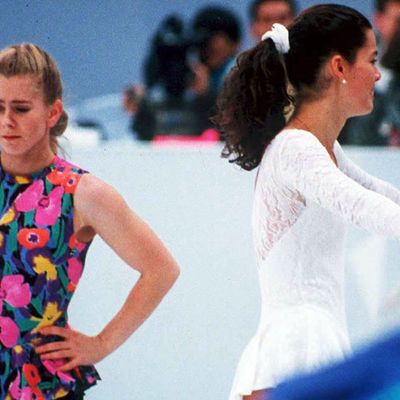
This week marks the twentieth anniversary of figure skating’s most infamous scandal, the Tonya Harding-Nancy Kerrigan knee-whacking (which, you may recall, involved a blunt object, a conspiracy to keep Kerrigan out of the Olympics, and a media-friendly rivalry pitting two female stars against each other). The widely accepted version of events has Harding putting her ex-husband up to the attack — but a new essay by Sarah Marshall in The Believer presents a much more sympathetic version of the skating-world pariah, raising provocative questions about the way that Harding was typecast in the media and the widespread willingness to accept her abusive ex-husband’s word over hers.
Back in January 1994, Kerrigan was walking to the locker rooms after a final practice before the U.S. Figure Skating National Championships when a man darted out behind a set of curtains and hit her upper thigh with a police baton. Fortunately for Kerrigan, the attacker missed her knee, but the injury was serious enough that doctors advised her not to compete the next day. In her absence, Kerrigan’s chief rival, Tonya Harding, won the gold, securing her spot on the Olympic team.
It soon emerged that Kerrigan’s attacker was Shane Stant, a hit man hired by Harding’s ex-husband (with whom she was back together at the time). In the weeks leading up to the Lillehamer Olympics, Harding’s ex, Jeff Gillooly, and his two conspirators would plead guilty to the attack, with Gillooly accepting a plea bargain in exchange for testimony against Harding. Harding, who was controversially allowed to compete in the Olympics despite the ongoing investigation (she placed eighth; Kerrigan won the silver), said repeatedly that she had no knowledge of the plot to attack her competitor, though Gillooly claimed she signed off on it. Eventually, Harding pleaded guilty to conspiring to hinder the prosecution of the attackers. She was sentenced to three years on probation, 500 hours of community service, a $160,000 fine, was stripped of her national championship title, and was banned from figure skating for life.
The anniversary of the scandal makes perfect pre-Olympics media fodder, especially since U.S. figure skating is not the powerhouse that it used to be. This week, news outlets are touting a clip of a rare interview with Harding that will appear in an upcoming ESPN documentary, The Price of Gold, which airs January 16, in which Harding claims that the media frenzy following the attack ruined her life. Though Harding continues to deny that she had any prior knowledge of the attack, the media remains dubious, reluctant to give up a favorite female villain.
In The Believer, Marshall argues that Harding has been unfairly vilified: “As with so many other women at the center of a scandal, the media did an exceptionally good job of selling Tonya as an extraordinary specimen, a woman unique in her shamelessness, greed, and brutality,” Marshall writes. She combs The Tonya Tapes, a 2008 book of interview material for a memoir that fell apart, and draws some devastating conclusions about Tonya’s life and figure-skating career. The circumstances of Harding’s marriage, and the media’s obfuscation of her reports of abuse and domestic violence, are particularly sobering:
She started competing under the name Tonya Harding-Gillooly, then divorced her husband in 1993, only to reconcile with him soon after. Later, when it came time to fit her life story into the scandal’s narrative, journalists delighted in using this detail as proof of Tonya’s tackiness. Despite her allegations of abuse, despite the restraining orders and 911 calls she placed, and despite her claims that she feared for her life both before and after the assault on Nancy, few phrases had quite the same cachet, or were quite so gleefully suggestive as white-trash lifestyle, as live-in ex-husband.
In interviews, Harding explains that she kept going back to her husband because he was “always saying the right things to get me back, and I’d be stupid enough to go back and get beat up again.” Yet Marshall reveals that the U.S. Figure Skating Association (USFSA) also gave Harding a pretty strong incentive to stay in her marriage:
In the book, Tonya also maintained her innocence in the scandal’s planning, telling a version of the story that seemed just as plausible as the one that had quickly gained acceptance during the event’s coverage. She said she had attempted reconciliation with Jeff following their divorce, in 1993, because a representative from the United States Figure Skating Association told her to do so “unless I didn’t want the marks. If I wanted to make the Olympic team, I need to make myself a stable life … They said I had a stable life when I was with him — married, settled down … And they wanted to make sure I was still going to be that way to go to the Olympic Games.”
In a sport where judges routinely give skaters criticism on their hairdos and costumes and earrings and eye makeup and teeth (and suggest that failing to change such details might well result in lowered scores); in a sport where, to this day, very few gay male skaters can afford to be openly gay and deal with inevitable backlash not just in the media, but in their scores; in a sport where women are sometimes rewarded more for saleability than skill; in a sport where gender roles are policed so rigidly, on and off the ice; that Tonya Harding, a petite, blonde, white woman, was somehow butch enough to register as a threat to skating’s femininity — in a sport where all this went on, and was in fact common knowledge, the idea that the USFSA would attempt to control a skater’s marital status is hardly implausible. It wanted Tonya to be proper, or at least as proper as she could be. They wanted her to train hard and skate reliably so she could compete well at the Olympics if she remained the only American skater who could match Nancy’s maturity and skill — a very plausible prospect at the time, even if the USFSA didn’t want to admit it. If the representative Tonya says she spoke to had been aware of Jeff’s abuse, there must have seemed too much at stake to give Tonya’s claims much credence. Tonya was abused by her mother, her husband, and finally, her sport, whose criticisms of her — she wasn’t pretty; she was too fat; she didn’t deserve to be here; why couldn’t she do anything right? — savagely echoed the criticism she had been enduring for her entire life.
The piece makes some astute observations about female athletes in the media, and particularly, the bizarre culture of figure skating. It’s worth a read while you wait for the Olympic Ladies Free Skate.





